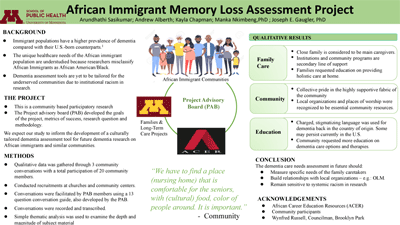Arundhathi Pattathil Sasikumar
MPH, Public Health Administration & Policy
Co-Authors:
Andrew Alberth, Kayla Chapman, Dr. Manka Nkimbeng. Parent Research Team: Drs. Joseph E. Gaugler; Manka Nkimbeng
Advisor:
Dr. Joseph Gaugler
Educational Objectives:
- Develop a culturally informed community conversation guide for the African Immigrant population.
- Assess dementia care needs, knowledge, areas of resilience and resources.
- Identify system-level barriers in access and treatment in the African Immigrant community living in Minnesota.
Keywords:
Dementia care, African immigrant community
Abstract
In Minnesota alone there are 97,000 individuals living with dementia, and many of them are cared for by family members. The African-American population is twice as likely to have dementia as their Caucasian counterparts and are less likely to seek care for dementia. The few studies on dementia prevalence in immigrant communities show that immigrant populations have a higher prevalence of dementia compared with their U.S.-born counterparts. Additionally, the unique healthcare needs of the African immigrant population are unidentified because researchers have traditionally grouped them into a racial category of African American/Black. This study assesses the dementia care needs, knowledge, areas of resilience, resources and the system-level barriers in access and treatment in the African Immigrant community living in Minnesota. It is a community-based participatory approach; representatives from the African immigrant community, African Career, Education, and Resources, Inc. (ACER) and the Families and Long-Term Care Projects (FLTC) are collaborators and shared decision makers. Four large community conversations will be conducted and a total of 50 participants are expected. Trained facilitators will follow a culturally-informed community conversation guide to enable honest and open conversations with community members in spaces that are comfortable and convenient for participants. Personal stories and experiences shared by the community will narrate the current scenario of dementia care in the population. The qualitative data will be analyzed using NVivo software and will guide the development of future research work and, in particular, a culturally-tailored community resource assessment.
Support
PHDR 2019-2020 Health Disparities Pilot Grants Award

View Poster (PDF)
